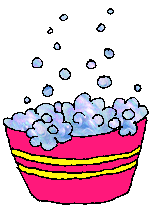GRANNY'S
WASHING LESSON
AND
APRON STORY
Many years ago an
Arkansas grandmother gave the
new bride the following recipe for washing clothes. It
appears below just as it was written, and despite
the spelling, has a bit of philosophy.
This is an
exact copy as written and found in an old scrap book
( with spelling errors and all ).
1. Bilt fire in backyard to heat kettle of rain water.
2. Set tubs so smoke wont blow in eyes if wind is pert.
3. Shave one hole cake of lie soap in
bilin water.
4. Sort things, make 3 piles. 1 pile
white, 1 pile
colored, 1 pile work britches and rags.
5. To make starch, stir flour in cool water to
smooth, then thin down with bilin water.
6. Take white things, rub dirty spots on board,
scrub hard, and then bile..
Rub colored don't bile, just rinch and starch.
7. Take things out of kettle with broomstick
handle, then rinch, and starch.
8. Hang old rags on fence.
9. Spread tea towels on grass.
10. Pore rinch water in flower bed.
11. Scrub porch with hot soapy water.
12. Turn tubs upside down.
13. Go put on clean dress, smooth hair with hair
combs. Brew cup of tea, sit and rock a spell
and count your blessings.
Paste this over your washer and dryer and next
time when you think things are bleak, read it again
and give thanks for your blessings.
 |
GRANDMA'S
APRON |
 |
The
principle use of Grandma's apron was to protect the dress underneath,
but along with that, it served as a holder for removing hot pans from
the oven; It was wonderful for drying children's tears, and on
occasion
was even used for cleaning out dirty ears.
From
the chicken-coop the apron was used for carrying eggs, fussy chicks, and
sometimes half-hatched eggs to be finished in the warming oven.
When
company came those aprons were ideal hiding places for shy kids; And
when the weather was cold, grandma wrapped it around her arms. Those big
old aprons wiped many a perspiring brow, bent over the hot wood stove.
Chips and kindling wood were brought into the kitchen in that
apron.
From
the garden, it carried all sorts of vegetables. After the peas had been
shelled it carried out the hulls. In the fall the apron was used
to bring in apples that had fallen from the trees.
When unexpected company drove up the road, it was surprising how much
furniture that old apron could dust in a matter of seconds. When
dinner was ready, Grandma walked out onto the porch, waved her apron,
and the men knew it was time to come in from the fields to dinner. It
will be a long time before someone
invents something that will replace that "old-time apron" that
served so many purposes.
Background music - "The Irish Washerwoman" |


